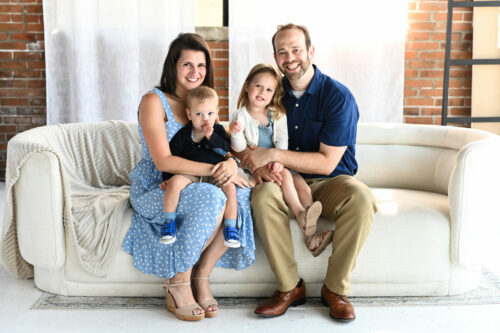Written by Rebecca Ruberg
Take a second and think about the Flintstones. What do you actually remember about the show? If you are anything like me, you might remember the name of the central characters and can even describe them. By now, the theme song is stuck in your head and you are yelling “YABBA DABBA DOO!” And you are wondering why you remember every word of a theme song from a cartoon that aired before you were born but can’t remember what you ate for breakfast this morning. I admittedly did not remember much about the show when my family and I chose to dress as The Flintstones for this upcoming Purim. This year our synagogue’s theme is cereal mascots; as Fruity Pebbles and Cocoa Pebbles are staples (only on Shabbat!) in our household, we landed on the Flintstones. And so began the education process of getting our toddlers excited about a show they had never seen.
We pulled out the iPad, and searched for an episode starring Pebbles, as my daughter was eager to learn more about the character behind her costume. As we cuddled in bed we settled in for an episode in which Fred Flintstone lamented that Barney and Betty Rubble were coming over again. As they arrived, Barney and Betty fawned over the Flintstones’ daughter Pebbles, referring to themselves as Uncle Barney and Aunt Betty. Fred seemed irritated and at first it seemed he was jealous of Barney, as Barney’s antics made Pebbles laugh. As Fred grew more and more agitated, he lost his temper and screamed, “Get out of my house!”
As Barney and Betty protested, Fred responded, “Get your own baby and leave mine alone!” Betty and Barney left in tears and Wilma lectured her husband, saying, “Thank god our baby is too young to understand that you made our best friends feel bad, just because we have been blessed with a child and they have not.” I watched, mouth agape. Had I understood the plot correctly… were the The Rubbles infertile? Had there been any remaining doubt, my hypothesis was confirmed in the next scene. Barney consoles a sobbing Betty, who felt terrible for imposing on the Flintstones and Barney responded, “We were so anxious to have a baby, that we took it out on Fred and Wilma.”
The episode concluded with the adoption of BamBam Rubble. Yes. You read that correctly. BamBam was adopted.
I started to cry. My daughter was very confused. This scene was all too familiar for me; it brought me back to a time early on in our own fertility journey. My husband and I had been trying for about a year, and had just started undergoing testing with a fertility specialist. We had not yet owned our diagnosis and were private about it. At the time, my father was scheduling a highly invasive surgery and I was coordinating my work schedule to arrange to be present. I lamented to a colleague that my brother would not be coming in for the surgery, as his wife was due to give birth imminently in another state. I was frustrated that I felt the weight of parental care, while he did not. My colleague innocently jested, “Well, you could get out of it too, just go have a baby!”
Much like Barney and Betty’s response, tears rolled down my cheeks, quickly turning into full-on sobs at my desk. I opened up to my colleague, who in turn shared about her own journey. She became my confidant through the remainder of the long road that brought me to snuggling in bed with a 4-year old watching the Flintstones.
This moment showed me the power of sharing the journey. I committed to sharing my experiences openly and honestly as I charted a new path forward. Our friends, family, and colleagues could only support us if they knew what we were going through. If they understood the impact of their words.
The Flintstones provide an important reminder that infertility dates back all the way to the Stone Age. From the Flintstones to our matriarchs and patriarchs in the Torah, continuing through modern times. Couples have struggled to conceive and their friends have struggled to find the best ways to express support or, in Fred’s case, set boundaries.
It’s unclear if Fred knew of The Rubbles’ struggles prior to his careless outburst. We know he felt terrible upon learning the Rubbles truth and the Rubbles felt guilty for imposing their infertility struggles on their friends . By sharing, we change the impression that fertility is easy. After all, if we only share the stories of successes without the journey, we incorrectly paint the illusion that it’s easy, leaving scores of couples feeling scared, unprepared, uninformed, confused and alone. By sharing our own story, my husband and I gained a community of people who had walked in our shoes. In addition, scores of friends and family showed their interest in learning more about how to properly support us.
I am personally excited to imbue what started as a frivolous Purim costume with new meaning. Our costumes provide us with an opportunity to share with others the little-known revolutionary history of the Flintstones as the first show on TV to discuss infertility. The Flintstones took a risk by featuring a topic that at the time was deemed controversial. If Queen Esther taught us anything in the Purim story, it was that by sharing our full selves, even if that leaves us in a vulnerable position, we can create change. Not just for ourselves, but for generations to follow.



